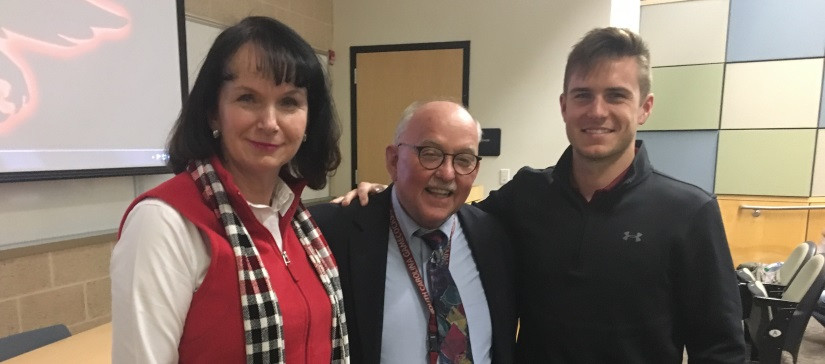February 9, 2018 | Erin Bluvas, bluvase@sc.edu
In 1982, Gaye Christmus was an Arnold School student, pursuing a master of public health in health education (now known as health education, promotion, and behavior (HPEB)). Unfamiliar with environmental health sciences (ENHS), she wasn’t sure what to expect when she enrolled in ENHS 660, an introductory course taught by then-adjunct instructor and now clinical professor and ENHS chair Geoff Scott.
“It turned out to be a fantastic class,” she says. “Dr. Scott was—and still is—an engaging and passionate teacher, who brings his extensive field knowledge into the classroom. Also, I learned more about South Carolina oysters that summer than I ever thought possible!”
Fast forward 35 years. Gaye has been a grant writer and editor in the department of exercise science for the past 18 years, and her son, Sam Christmus, has just completed his first semester in the MPH in HPEB program—even taking Scott’s 660 course in his first set of classes. The MPH program and Scott’s course have evolved, but the atmosphere is still the same.
“Dr. Scott is one of the kindest people you will ever meet,” Christmus, pictured above (right) with his mother (left) and Scott (center), agrees. “He genuinely cares about the subject matter he teaches, as well as the success of his students, and it was a pleasure to be in his class!”
Having grown up in Columbia, attending UofSC for his undergraduate degree was an easy decision for Christmus. His interest in population health led him to choose public health as his major, and from there, the President’s and Dean’s list recipient developed an interest in global health.
As an undergraduate, Christmus served as president of the University of South Carolina Chapter of International Justice Mission and spent a summer as a public health intern in Uganda—organizing medical clinic days, teaching an infectious disease public health course at a primary school, and partnering with local missionaries. After a year working with HPEB professor Jim Thrasher studying the presence of tobacco in video games and its potential effects on children who play those games, Christmus enrolled in the MPH program.
“I am particularly interested in global health issues such as water and sanitation hygiene, infectious diseases, food security, environmental safety, and other issues which plague less-developed nations,” says Christmus. “I chose to apply for the MPH in HPEB because HPEB as a department focuses a great deal of attention on program design, implementation and evaluation—all crucially important for anyone who hopes to work in the field of global health. Also, a number of the HPEB faculty members have research interests that reach beyond South Carolina and the United States.”
Through his two Arnold School programs, Christmus has gotten to know associate dean for undergraduate student affairs Sara Corwin and clinical associate professor Kara Montgomery. “Although there are many faculty members who have been helpful to me over the years, Dr. Corwin and Dr. Montgomery have been two of the most influential,” says Christmus. “I have developed meaningful friendships with both of them, and I can tell that they genuinely care about my success in school and in my future career.”
“Get to know your professors—especially if you’re an undergraduate,” adds Christmus, who plans to work for a non-profit, government or multi-lateral organization focused on public health intervention in less-developed countries after his 2019 graduation. “For graduate students, I would suggest not going into a program without any sort of plan or idea of what you want to do as a career. You will get the most out of a graduate program if you have begun to develop specific interests within the field of public health, and from there you can begin to tailor your degree.”
